裕兴新概念英语第二册笔记 第五十课 课文讲解
裕兴新概念英语第二册笔记-第50课

裕兴新概念英语第二册笔记-第50课Lesson 50 Taken for a ride 乘车兜风Why did the writer not get off the bus at Woodford Green?I love travelling in the country, but I don't like losing my way.I went on an excursion recently, but my trip took me longer than I expected.'I'm going to Woodford Green,' I said to the conductor as I got on the bus, 'but I don't know where it is.''I'll tell you where to get off.' answered the conductor.I sat in the front of the bus to get a good view of the countryside. After some time, the bus stopped. Looking round, I realized with a shock that I was the only passenger left on the bus.'You'll have to get off here,' the conductor到学校只有5分钟公共汽车车程。
take sb for a ride 欺骗某人take ……for 把…认为是,把…看成为eg:Don’t be serious . Just take it for a joke .不要太认真就把它当作是一个笑话。
裕兴新概念英语第二册笔记第50课
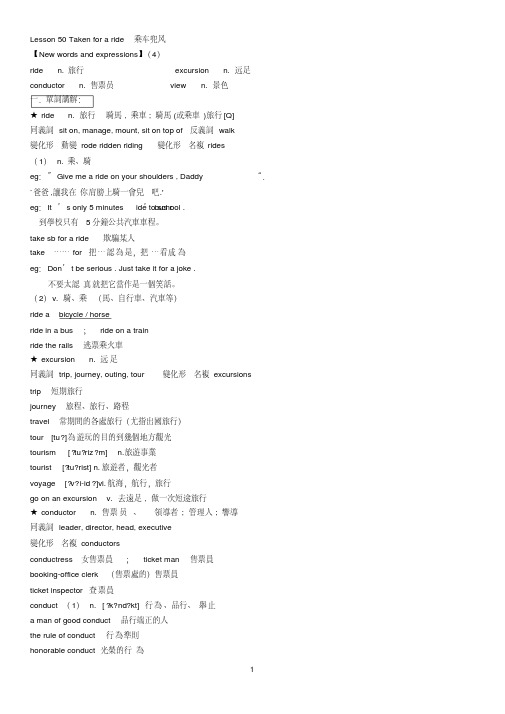
Lesson 50 Taken for a ride 乘车兜风【New words and expressions】(4)ride n. 旅行excursion n. 远足conductor n. 售票员view n. 景色一.單詞講解:★ ride n. 旅行騎馬, 乘車; 騎馬(或乘車)旅行[Q]同義詞sit on, manage, mount, sit on top of 反義詞walk變化形動變rode ridden riding 變化形名複rides(1)n. 乘、騎eg:”Give me a ride on your shoulders , Daddy “.`爸爸,讓我在你肩膀上騎一會兒吧.'ide to school .eg:It’s only 5 minutes’ bus r到學校只有5分鐘公共汽車車程。
take sb for a ride 欺騙某人take ……for把…認為是,把…看成為eg:Don’t be serious . Just take it for a joke .不要太認真就把它當作是一個笑話。
(2)v. 騎、乘(馬、自行車、汽車等)ride a bicycle / horseride in a bus ;ride on a trainride the rails 逃票乘火車★ excursion n. 远足同義詞trip, journey, outing, tour 變化形名複excursionstrip 短期旅行journey 旅程、旅行、路程travel 常期間的各處旅行(尤指出國旅行)tour [tu?]為遊玩的目的到幾個地方觀光tourism [?tu?riz?m] n.旅遊事業tourist [?tu?rist] n.旅遊者,觀光者voyage [?v?i-id?]vi.航海,航行,旅行go on an excursion v. 去遠足, 做一次短途旅行★ conductor n. 售票员、領導者; 管理人; 響導同義詞leader, director, head, executive變化形名複conductorsconductress 女售票員;ticket man 售票員booking-office clerk (售票處的)售票員ticket inspector 查票員conduct (1)n. [?k?nd?kt] 行為、品行、舉止a man of good conduct 品行端正的人the rule of conduct 行為準則honorable conduct 光榮的行為shameful conduct 可恥的行為(2)v. [k?n'd?kt] 引導, 指揮, 管理eg:He conducted me around the museum . 他帶領我到博物館內四處參觀。
新概念2lesson50课文
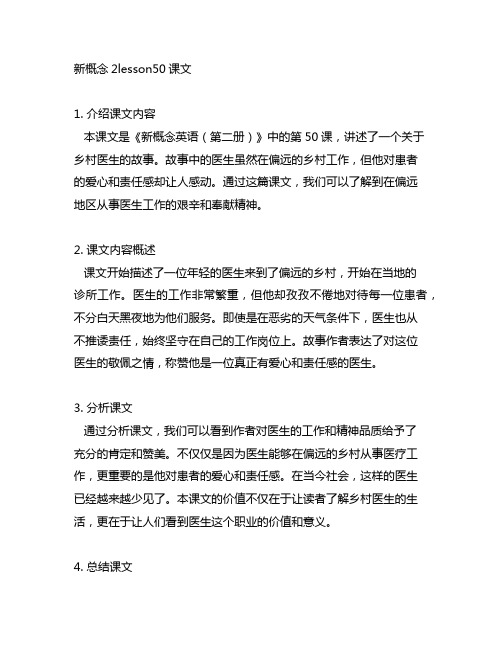
新概念2lesson50课文1. 介绍课文内容本课文是《新概念英语(第二册)》中的第50课,讲述了一个关于乡村医生的故事。
故事中的医生虽然在偏远的乡村工作,但他对患者的爱心和责任感却让人感动。
通过这篇课文,我们可以了解到在偏远地区从事医生工作的艰辛和奉献精神。
2. 课文内容概述课文开始描述了一位年轻的医生来到了偏远的乡村,开始在当地的诊所工作。
医生的工作非常繁重,但他却孜孜不倦地对待每一位患者,不分白天黑夜地为他们服务。
即使是在恶劣的天气条件下,医生也从不推诿责任,始终坚守在自己的工作岗位上。
故事作者表达了对这位医生的敬佩之情,称赞他是一位真正有爱心和责任感的医生。
3. 分析课文通过分析课文,我们可以看到作者对医生的工作和精神品质给予了充分的肯定和赞美。
不仅仅是因为医生能够在偏远的乡村从事医疗工作,更重要的是他对患者的爱心和责任感。
在当今社会,这样的医生已经越来越少见了。
本课文的价值不仅在于让读者了解乡村医生的生活,更在于让人们看到医生这个职业的价值和意义。
4. 总结课文《新概念英语(第二册)》第50课的课文内容感人至深,让人对医生这个职业重新产生了敬意。
希望通过这样的故事,能够唤起更多人对医疗工作者的关注和支持,让他们在工作中感受到更多的温暖和鼓励。
也希望更多的人能够向这位乡村医生学习,将爱心和责任感贯穿于自己的工作中,为社会做出更大的贡献。
5. 结语通过这篇课文的阅读,让我们感悟到了偏远地区医生的艰辛和奉献精神,也让我们对医疗工作者有了更深层次的理解和尊重。
希望这样的故事能够被更多人了解和传播,让更多人受到启发和感动。
对乡村医生的敬佩和尊重是因为他们所承担的职责既艰巨又崇高。
在乡村医疗条件有限的情况下,医生们需要承担更多的责任,他们既是医生,也是心理沟通师,是患者心灵上的支柱。
他们需要全情投入、忘我奉献,时刻准备应对任何可能出现的医疗急救情况。
他们的工作灰常辛苦,但始终坚守在自己的岗位上,默默地为患者们奉献着。
新概念第二册-Lesson 50 Taken for a ride

NEW WORDS AND EXPRESSION
ride /raɪd/ n. 旅行
conductor /kənˈdʌktə(r)/ n. 售票员
excursion /ɪkˈskɜː(r)ʃ(ə)n/ n. 远 view /vjuː/ n. 景色 足
WHY DID THE WRITER NOT GET OFF THE BUS AT WOODFORD GREEN?
lose one’ way, 迷路 I love travelling in the country, but I don't like losing my 。way.
TEXT
I went on an excursion recently, but my trip took me longer than I
GRAMMAR REVIEW: 动词不定式
I’ll tell you where to get off. 我告诉你哪里下车。 在这个句子中,副词where加上动词不定式to get off组成一个名词性结 构,作动词tell的直接宾语。
I sat in the front of the bus to get a good view of the countryside. 我坐在车的前部,以便饱览农村风光。 in the front of作“在......前部”讲; to get a good view动词不定式短语作状语,表示目的。
RIDE
ride /raɪd/ v. 骑 n. 旅行 give a ride take a ride 标题“Taken for a ride”中take ... for ... 是 “把......当作......”的意思。taken for a ride意 思是“就当作是一次乘车兜风”;take ab. for a ride又作“欺骗”讲,因此taken for也有 “上当了”的含义。
新概念英语第二册逐句精讲语言点第50课(3)
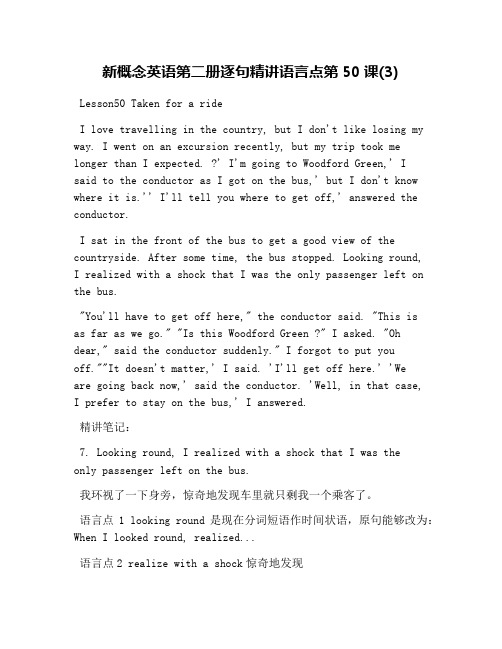
新概念英语第二册逐句精讲语言点第50课(3)Lesson50 Taken for a rideI love travelling in the country, but I don't like losing my way. I went on an excursion recently, but my trip took me longer than I expected. ?' I'm going to Woodford Green,' Isaid to the conductor as I got on the bus,' but I don't know where it is.'' I'll tell you where to get off,' answered the conductor.I sat in the front of the bus to get a good view of the countryside. After some time, the bus stopped. Looking round, I realized with a shock that I was the only passenger left on the bus."You'll have to get off here," the conductor said. "This isas far as we go." "Is this Woodford Green ?" I asked. "Oh dear," said the conductor suddenly." I forgot to put you off.""It doesn't matter,' I said. 'I'll get off here.' 'Weare going back now,' said the conductor. 'Well, in that case, I prefer to stay on the bus,' I answered.精讲笔记:7. Looking round, I realized with a shock that I was theonly passenger left on the bus.我环视了一下身旁,惊奇地发现车里就只剩我一个乘客了。
《新概念英语》同步讲义:第2册第50课
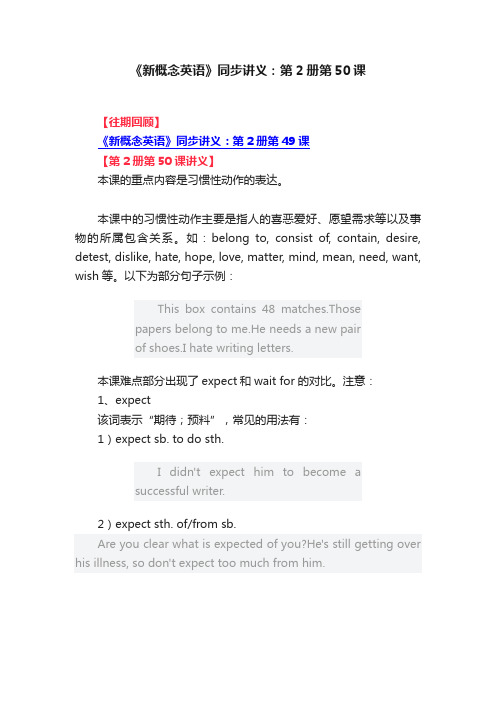
《新概念英语》同步讲义:第2册第50课
【往期回顾】
《新概念英语》同步讲义:第2册第49课
【第2册第50课讲义】
本课的重点内容是习惯性动作的表达。
本课中的习惯性动作主要是指人的喜恶爱好、愿望需求等以及事物的所属包含关系。
如:belong to, consist of, contain, desire, detest, dislike, hate, hope, love, matter, mind, mean, need, want, wish等。
以下为部分句子示例:
This box contains 48 matches.Those
papers belong to me.He needs a new pair
of shoes.I hate writing letters.
本课难点部分出现了expect和wait for的对比。
注意:
1、expect
该词表示“期待;预料”,常见的用法有:
1)expect sb. to do sth.
I didn't expect him to become a
successful writer.
2)expect sth. of/from sb.
Are you clear what is expected of you?He's still getting over his illness, so don't expect too much from him.。
新概念英语第二册50课介绍

本课语法 :一般现在时 在第2课中,我们讲了一般现在时用于表达“有规律的, 或是习惯性的动作”。(often/always) 在第26课中,我们又讲了了一般现在时的用法: 当我们要表达一个永恒不变的或是有规律的动作时,也 就是用于普遍性真理时,我们必须用 一般现在时。比如: The earth goes round the sun.地球围绕太阳转。 表示状态和感觉的静态动词我们使用一般现在时而不用 于进行时,比如: appear(出现), appreciate(感激), believe(相 信), feel(感觉), forget(忘记), hear(听到), know(知道), like(喜欢), look(看起来), notice (注意到), remember(想起), resemble(相似), see(看到), think(认为), understand(理解)。
5.I sat in the front of the bus to get a good view of the countryside. 我坐在汽车的前部,以便饱览农村风光。
in front of & in the front of in front of 指在某一物体外的前面,其反义词为behind; in the front of 指某一物体里面的前部分,有时用at the front of,其反义词是at the back of。 比较: The man is sitting in the front of the car. 那个男人坐在车的前部。(在驾驶员旁边) The man is sitting in front of the car. 那个男人坐在车的前面。(车的外面)
2. I went on an excursion recently, but my trip took me longer than I expected. 最近我作了一次短途旅行,但这次旅行所花费的时间比我 预计的要长。 (1)Go on an excursion 作一次郊游 Excursion 指 “短途旅行,远足,集体游览”,着重在短 距离而准备迅速返回的游览、娱乐活动。表示 “旅行” 之意的名词通常与go on连用,它在这里的含义为“为 (某一目的)而去”: I'll go on holiday next month. 我下个月去度假。 Did you go on a trip last month? 你上个月去旅行了吗
逐句精讲新概念英语第二册第50课乘车兜风
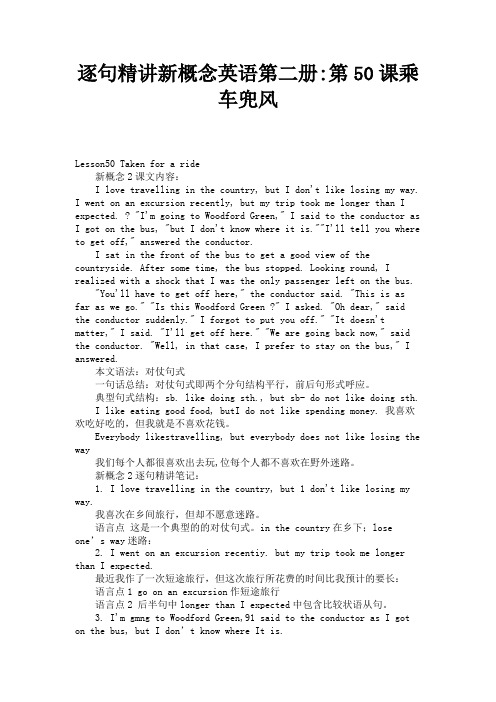
逐句精讲新概念英语第二册:第50课乘车兜风Lesson50 Taken for a ride新概念2课文内容:I love travelling in the country, but I don't like losing my way.I went on an excursion recently, but my trip took me longer than I expected. ? "I'm going to Woodford Green," I said to the conductor as I got on the bus, "but I don't know where it is.""I'll tell you where to get off," answered the conductor.I sat in the front of the bus to get a good view of the countryside. After some time, the bus stopped. Looking round, I realized with a shock that I was the only passenger left on the bus."You'll have to get off here," the conductor said. "This is asfar as we go." "Is this Woodford Green ?" I asked. "Oh dear," said the conductor suddenly." I forgot to put you off." "It doesn't matter," I said. "I'll get off here." "We are going back now," said the conductor. "Well, in that case, I prefer to stay on the bus," I answered.本文语法:对仗句式一句话总结:对仗句式即两个分句结构平行,前后句形式呼应。
